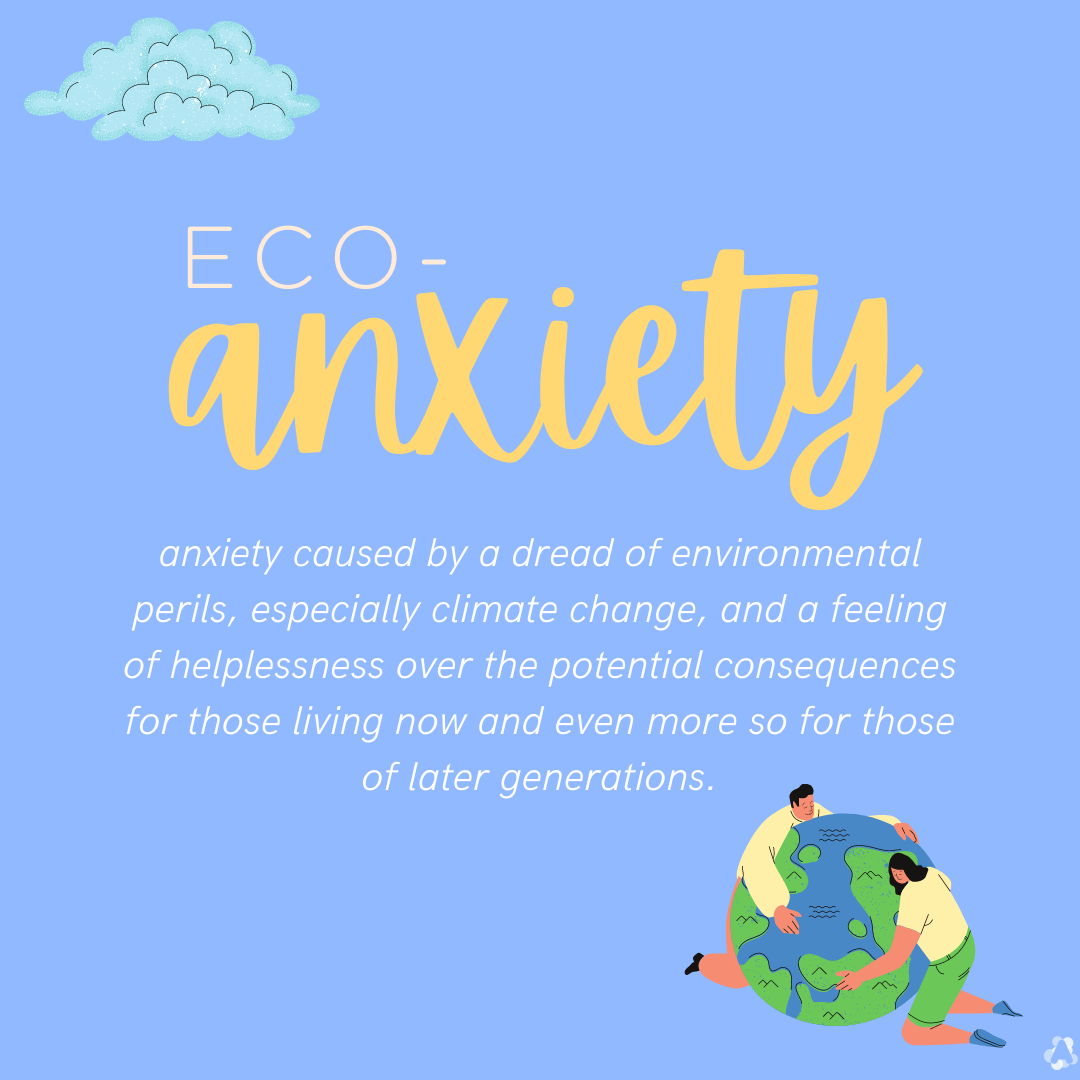“Eco-anxiety is a sign that we are beginning to recognize the severity of the environmental crisis we are facing. It is a call to action, urging us to take responsibility for our actions and work towards a more sustainable future.”
– Dr. Sylvia Earle, Marine Biologist and Oceanographer
“Eco-anxiety” is a newer term but has become widely known as more begin to understand the severity and urgency of the ongoing environmental crisis; it is a form of anxiety related to environmental issues, including climate change, pollution, deforestation, species extinction, overpopulation, and other environmental challenges.
Understandably, ‘doomscrolling’ (the act of spending an excessive amount of time reading negative news online) and seeing keywords like “torrential floods,” “melting ice sheets,” “rainfall warning,” or “heat wave” can increase environmental anxiety.
Eco-anxiety can lead to helplessness, despair, and loss of hope for the future—especially for Gen Z or those born between 1997 and 2012. Per Yale Environment 360, climate anxiety is greatest for Gen Z, who have been bombarded with news of climate disasters on social media and in the news. They “feel betrayed by government inaction” and upset when told they are “overreacting to what they see as an existential threat.”
Close to 40% of Gen Z surveyed also said that fears about the future have made them reluctant to have children one day.
“Eco-anxiety, or more specifically fears around global warming and the sustainability of our planet, has become more prominent in the last decade,” says Mark Antczak, Anxiety Canada’s in-house Registered Clinical Counsellor and Clinical Educator.
Mark further suggests that “uncertainty is especially hard to tolerate or sit with when it relates to anything we feel we have less control of, which in the case of the climate can feel especially true.”
Eco-anxiety, like generalized anxiety, involves excessive worry and fear about the future. However, eco-anxiety is a specific type of anxiety that is rooted in concerns about the environment.

The issue of climate change can often be politicized, and although we can challenge and reframe our anxious thoughts around environmental issues, eco-anxiety centres on valid concerns about the planet. Current climate issues are complex, and it is natural to feel concerned about the impact of climate change on our lives.
Nonetheless, it is important to note that eco-anxiety can have similar symptoms and treatments as generalized anxiety, like cognitive-behavioural therapy, as well as other therapeutic and relaxation techniques.
“Eco-anxiety is a real and valid concern, especially among young people who are more likely to be aware of the severity of environmental issues. We must support these individuals and provide them with the tools and resources they need to take action and create positive change.”
– Dr. Michael Mann, Climate Scientist
Minimize & Manage Eco-Anxiety
Prioritize Your Mental Health
- Connect with like-minded people. Join a local environmental group or participate in environmental campaigns. Studies show that connecting with like-minded people can reduce isolation and provide a sense of community and purpose.
- You may get tired of hearing it, but it’s essential to practice self-care. Engage in activities that help reduce stress (exercise, meditation, or spending time in nature or with pets). Check out our Downloadable Resources for more tips, including how to get started with Calm Breathing and How to Tolerate Uncertainty.
- Learn more about how you can educate yourself on environmental issues and take action. Concrete steps to reduce your environmental impact, like reducing energy consumption and recycling, can help alleviate stress around the climate.
Engage in a Mindful Way
69% of Gen Z feel anxious after seeing online content about climate change, according to Pew Research Centre, and we live in a time where we have constant access to news and information. Staying informed about current events is important, and it’s amazing how technology allows us to learn news so quickly; however, too much exposure to negative news can worsen anxiety and stress.
We know that when it comes to anxiety, it is best to ACT not avoid. But taking a break doesn’t necessarily mean avoiding, and sometimes, when it comes to climate news, a break is a must.

- Be mindful of how much news you consume. Some people strive to remain up-to-date on the latest news to show that they care about the world around them. Staying informed is essential, and caring about your peers is fantastic, but limiting your exposure to negative information to protect your well-being is equally important. Try to find a balance to protect your mental health.
- Minimize anxiety around climate news by setting app time limits. Because social media and news apps can be significant sources of stress and anxiety, consider setting app time limits to help manage your screen time and reduce exposure to negative news.
- Choose your news sources carefully, as not all are created equal. Try to stick with outlets that are reputable, unbiased, and trustworthy. Avoid sources that sensationalize news stories or rely on clickbait headlines.
- Create a Safety Plan. Pick a time when you are feeling calm, and talk with your loved ones about creating a household emergency plan. Find tips on how to create a solid strategy for extreme weather and wildfires and how to build an emergency kit on the Government of Canada website.
- Talk about it when you’re comfortable, but when eco-discussions spike your anxiety, you don’t have to say, “I can’t talk about this,” or “I am avoiding the news for my mental health.” Shutting a subject down abruptly can sometimes anger those who are passionate about a subject. Instead, you can briefly listen and express that you haven’t yet read up on the issue yet to inform an opinion before changing the subject.
Find Help
Remember: taking a break from the news cycle and prioritizing your mental well-being is okay (and even recommended). If your anxiety around the news is becoming unmanageable, reach out to your doctor or a mental health professional for support.
Check out our resources, including the free MindShift CBT app that helps you challenge and overcome anxiety, on our Get Help page.
Some of the best environment-specific resources include the David Suzuki Foundation, the Climate Action Network, and the government’s Environment and Climate Change Canada. These organizations offer a wealth of information on climate change science, policy, and activism, as well as resources for managing eco-anxiety and taking action to reduce your carbon footprint. Additionally, plenty of grassroots organizations and community initiatives across Canada focus on local environmental issues and offer opportunities for collective action to promote a sustainable future.
“Eco-anxiety, like other forms of anxiety, can have both positive and negative effects. On the one hand, it can motivate us to take action and make changes in our lives to address environmental issues. On the other hand, it can lead to feelings of hopelessness and despair, which can be counterproductive. It is essential to find a balance between these two extremes.”
– Dr. Renee Lertzman, Environmental Psychologist
Looking Ahead
Focus on progress and positive climate news when possible. Eco-anxiety can feel overwhelming and paralyzing, making it difficult to act or celebrate climate successes. We must balance awareness of the issues with a sense of agency and hope so that we can give ourselves space to advocate for change. If we see the potential for change and celebrate successes, we’ll be on the path to managing eco-anxiety and feeling better.
It’s not all on you; you’re not alone in your worries. And there is still good news amidst all the bad.

As climate psychologist, activist, and writer, Jessica Kleczka (@earthly education) says: “It’s not all doom and gloom. As science has shown, we still have a window of opportunity to mitigate the worst impacts of climate change and build a more sustainable future. By embracing scientific findings, adopting environmentally friendly practices, advocating for policies that prioritize climate action, and coming together as a global community, we can make a difference.”
